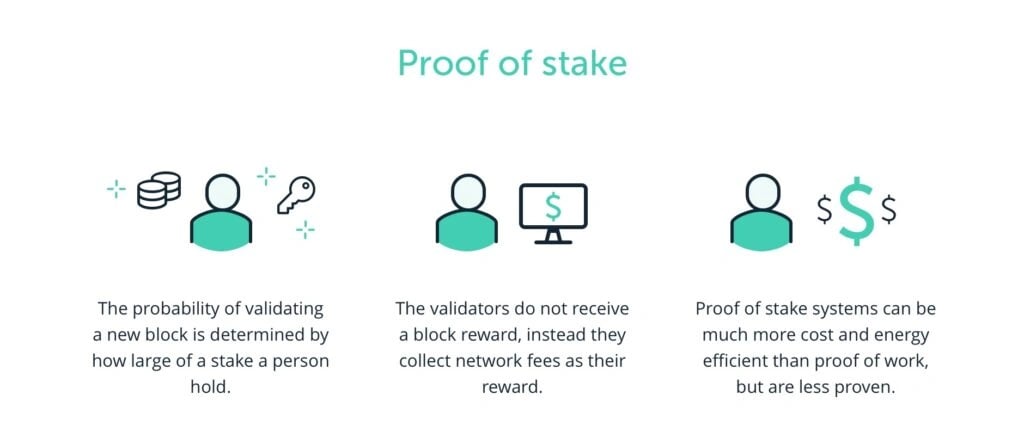위키 구독하기
Share wiki
Bookmark
Validator
에이전트 토큰화 플랫폼 (ATP):에이전트 개발 키트(ADK)로 자율 에이전트 구축
0%
Validator
검증인은 새로운 트랜잭션과 블록을 검증하고 유효성을 확인하는 네트워크 참여자입니다. 검증인은 사기 행위, 이중 지출을 방지하고 분산 원장의 신뢰성을 보장하는 데 중요한 역할을 합니다. 검증인은 어떤 트랜잭션이 유효하고 어떤 트랜잭션을 블록체인에 추가해야 하는지에 대한 의사 결정 과정에 기여합니다. 검증인은 네트워크를 지원하기 위해 암호화폐를 스테이킹하여 이를 수행합니다.[1][2]
개요
검증인은 트랜잭션 데이터 저장, 트랜잭션 처리 및 검증, 새로운 블록을 블록체인에 추가하는 역할을 합니다. 여기에는 블록체인 트랜잭션이 네트워크 규칙에 따라 유효한지 확인하고, 송신자가 트랜잭션을 완료할 충분한 자금이 있는지 확인하는 것이 포함됩니다. 작업에 대한 보상으로 검증인은 트랜잭션 수수료를 받습니다.[6]
검증인이 되려면 네트워크 참여자는 네트워크의 기본 암호화폐를 특정 금액만큼 묶어야 합니다. 이를 암호화폐 스테이킹이라고 합니다. 그들은 정직함을 보장하기 위해 이 금액을 담보로 제공합니다. 검증인은 규칙을 준수하도록 장려됩니다. 악의적인 행동을 시도하면 스테이크, 즉 자금이 삭감될 수 있기 때문입니다.[2]
검증인 역할
다양한 블록체인 네트워크는 다양한 합의 메커니즘을 사용하며, 각 메커니즘은 검증인을 선택하고 보상하는 고유한 접근 방식을 가지고 있습니다.
작업 증명(PoW)
PoW 블록체인의 검증인(종종 채굴자라고 함)은 작업 증명 합의 메커니즘(예: 비트코인)을 사용하는 블록체인에서 트랜잭션을 검증합니다. 이 방법을 사용하면 특수 컴퓨터를 가진 채굴자는 복잡한 수학 문제를 해결하기 위해 노력해야 합니다. 퍼즐을 먼저 푸는 채굴자는 블록 보상과 트랜잭션 수수료를 받습니다.[2][4]
지분 증명(PoS)
검증인은 특정 하드웨어 없이도 지분 증명(PoS) 블록체인에서 트랜잭션을 검증할 수 있습니다. 대신 코인을 스테이킹하여 정직함을 증명합니다. 그런 다음 트랜잭션을 확인한 후 트랜잭션 수수료로 보상을 받습니다.[2][4]

위임된 지분 증명(DPoS)
DPoS는 코인 보유자가 검증인이 될 대리인을 투표할 수 있도록 하여 PoS를 한 단계 더 발전시킵니다. 이러한 대리인(종종 모든 코인 보유자보다 적은 수)은 트랜잭션을 검증하고 네트워크의 무결성을 유지하는 책임을 맡습니다.[5]
비잔틴 장애 허용
PoW 또는 PoS를 합의 메커니즘으로 사용하지 않는 블록체인도 검증인을 사용할 수 있습니다. 여기서 일부 노드는 유효성 검사를 위해 부정확한 데이터를 제공하는 반면, 대부분의 검증인 노드는 정직하고 정확성이 보장됩니다. 결과적으로 일부 노드의 악의적인 행위에도 불구하고 체인에 더 많은 데이터가 추가됩니다.[7]
다양한 블록체인의 검증인
이더리움
이더리움은 작업 증명으로 시작하여 나중에 지분 증명 합의 메커니즘으로 천천히 이동했습니다. 병합은 2022년 9월 15일에 발생했습니다. 마이그레이션이 종료되면 이더리움의 참가자는 32개 이상의 ETH를 스테이킹하여 검증인이 되었습니다.[7]
솔라나
솔라나는 위임된 지분 증명(DPoS)을 합의 메커니즘으로 사용합니다. SOL을 보유한 사람은 누구나 유효성 검사 프로세스에 참여할 수 있습니다. SOL은 검증인에게 위임할 수 있습니다. 즉, 최소 금액을 스테이킹할 필요가 없습니다. 사람은 1 SOL만 가지고도 솔라나의 활성 부분으로 위임자가 될 수 있습니다.[7]
폴카닷
폴카닷은 환경 친화적인 지명된 지분 증명(NPoS) 알고리즘을 사용합니다. NPoS는 검증인과 지명자를 사용하여 보안을 극대화합니다. 검증인은 새로운 블록을 생성하고, 파라체인 블록의 유효성을 검사하고, 최종성을 보장합니다. 반면에 지명자는 DOT 토큰 형태로 스테이크를 사용하여 검증인을 선택할 수 있습니다.[7]
아발란체
아발란체는 지분 증명 합의 메커니즘의 변형을 사용하여 데이터의 보안과 정확성을 보장합니다. 아발란체는 투표 프로토콜입니다. 여기서 참가자는 트랜잭션을 수신하여 검증인 역할을 수행할 수 있습니다. 트랜잭션을 찾으면 수락 또는 거부에 투표합니다. 그런 다음 네트워크의 나머지 부분과 협력하여 모든 사람이 자신의 결정에 동의하는지 확인합니다. “반복적인 무작위 하위 샘플링”에 따라 네트워크는 다른 검증인을 무작위로 선택하여 요청하고 검증인의 결정의 정확성을 판단하기에 충분한 데이터를 구축할 때까지 여러 번 반복합니다.[7]
스텔라
스텔라는 비잔틴 장애 허용 합의 메커니즘에서 작동하는 블록체인입니다. 여기서 유효성 검사 프로세스는 일부 메시지가 손상될 수 있다고 예측합니다. 그러나 메시지가 총계의 1/3을 초과하는 한 데이터는 유효성 검사를 받을 수 있습니다. 그렇지 않으면 트랜잭션이 무효화됩니다.[7]
검증인 위험
시장 위험
검증인은 시장 상황 및 블록체인의 기본 토큰에 대한 수요와 관련된 위험에 직면할 수 있습니다. 하락 시장은 스테이킹된 토큰의 가치와 잠재적 보상에 영향을 미칠 수 있습니다.
유동성
검증인이 되려면 각 사용자는 특정 기간 동안 자산을 스테이킹해야 합니다. 이렇게 하면 잠금 기간이 끝날 때까지 자산에 액세스할 수 없게 됩니다. 결과적으로 사용자는 가치가 급격히 감소하거나 증가했을 때 자산을 판매할 수 없습니다.
소프트웨어 취약점
검증인은 노드 소프트웨어를 실행하여 블록 유효성 검사 및 합의에 참여합니다. 소프트웨어에 취약점이나 버그가 있는 경우 보안 침해, 네트워크 불안정 또는 자금 손실로 이어질 수 있습니다.
네트워크 공격
검증인은 분산 서비스 거부(DDoS) 공격을 포함한 네트워크 기반 공격에 취약하며, 이는 운영을 중단시키고 네트워크 안정성에 영향을 미칠 수 있습니다.
하드웨어 오류
검증인은 일반적으로 전용 하드웨어 또는 서버를 운영합니다. 하드웨어 오류 또는 인프라 문제는 가동 중지 시간으로 이어져 트랜잭션 및 블록의 유효성을 검사하는 능력에 영향을 미칠 수 있습니다.
비용
하드웨어 스테이킹에 필요한 자본은 비쌀 수 있으며, 여기에는 전기 및 인터넷 비용도 포함됩니다.[3]
검증인 페널티
슬래싱
슬래싱은 많은 블록체인 네트워크, 특히 PoS 합의 메커니즘에서 심각한 페널티입니다. 여기에는 악의적인 행동에 대한 처벌로 검증인의 스테이킹된 토큰의 일부를 몰수하거나 소각하는 것이 포함됩니다.
검증인은 이중 서명과 같은 행위에 대해 슬래싱될 수 있습니다.
- 두 개의 충돌하는 블록 또는 모순을 확인합니다.
- 네트워크 보안을 손상시키려고 시도합니다.
가동 중지 시간 페널티
PoS 및 위임된 지분 증명(DPoS) 시스템의 검증인은 장기간의 가동 중지 시간에 대해 페널티를 받을 수 있습니다. 가동 중지 시간 페널티는 종종 검증인이 얻는 보상의 감소, 네트워크에서 정지 또는 검증인 세트에서 제거로 이어집니다.
성능 페널티
검증인은 트랜잭션을 신속하거나 정확하게 검증하지 못하는 등 성능 요구 사항을 충족하지 못하는 경우 페널티를 받을 수 있습니다.
낮은 품질 또는 유효하지 않은 블록
검증인은 네트워크 규칙을 준수하지 않는 낮은 품질 또는 유효하지 않은 블록을 제안하는 경우 페널티를 받을 수 있습니다.
네트워크 업그레이드 준수
검증인은 네트워크 업그레이드 또는 프로토콜 변경 사항을 적시에 준수하지 않는 경우 페널티를 받을 수 있습니다. 비준수는 비호환성 및 네트워크 중단으로 이어질 수 있습니다.
투표 부정 행위
DPoS 시스템에서 검증인은 뇌물 수수와 같은 투표 부정 행위에 가담한 경우 페널티를 받을 수 있습니다. 페널티에는 투표권 박탈 또는 검증인 자격 박탈이 포함될 수 있습니다.
거버넌스 참여
제안 또는 프로토콜 변경에 대한 투표와 같이 블록체인 거버넌스에 적극적으로 참여하지 않는 검증인은 보상 감소 또는 투표 권한 상실을 포함한 페널티를 받을 수 있습니다.[8]
잘못된 내용이 있나요?
